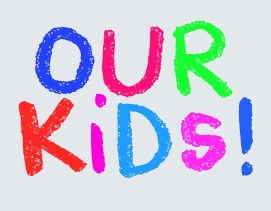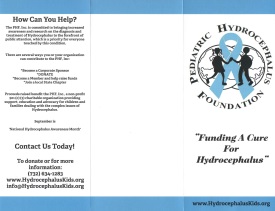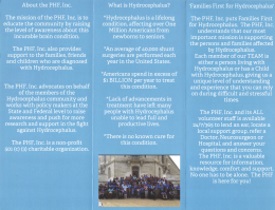PHF New York In The News: Town of Binghamton woman organizing hydrocephalus chapter
March 4, 2013 by PHF
Filed under Uncategorized
Comments Off on PHF New York In The News: Town of Binghamton woman organizing hydrocephalus chapter
 BINGHAMTON — Though it’s more common than Down syndrome, hydrocephalus — a condition where excess fluid gathers in the brain — isn’t well-known. Brandy Jackson is hoping to change that.
BINGHAMTON — Though it’s more common than Down syndrome, hydrocephalus — a condition where excess fluid gathers in the brain — isn’t well-known. Brandy Jackson is hoping to change that.
Jackson’s son, Kashawn Stroman, 14, acquired hydrocephalus from a brain tumor. He’s undergone several surgeries to repair and replace a shunt that drains the fluid from his brain.
“When Kashawn was diagnosed, we had no idea what it was,” said Jackson, who is a Town of Binghamton resident.
The mother of three is now organizing a local chapter of the Pediatric Hydrocephalus Foundation, helping to raise money and awareness about the affliction and provide help for those affected by a diagnosis.
“I just thought it was something I wanted to be involved in to help other families, to have a support system for other families,” Jackson said.
Over the past several weeks, fundraisers have been planned and Jackson has reached out to local hospitals and people, sometimes through social media sites. Jackson has even come across people from her past who are also dealing with the condition.
“A friend I grew up with has two daughters with hydrocephalus,” she said.
Most of those affected with hydrocephalus are born with it, said Kim Illions, president and chief executive officer of the Pediatric Hydrocephalus Foundation. One in every 500 babies born has the disease. Others, like Stroman, get it from trauma to the brain, she said, noting that another type of the disease also affects the elderly. The excess fluid, if not drained, places potentially harmful pressure on the brain and can be fatal if left untreated, Illions said, and there is no cure.
Since there is little information out there, it’s vital to get the word out through organizations like the Pediatric Hydrocephalus Foundation, Illions said. The Binghamton chapter will be the fourth in New York, with others in Westchester and Orange counties and Manhattan, she said.
“It’s really important because there are families who have no support whatsoever,” Illions said. “They feel very alone.”
That’s the way Kashawn felt when he was first diagnosed, Jackson said. He turned to the Internet and now talks to people all over the world who are living with hydrocephalus.
PHF Attends RDLA’s Rare Disease Lobby Day & Conference
March 4, 2013 by PHF
Filed under Uncategorized
Comments Off on PHF Attends RDLA’s Rare Disease Lobby Day & Conference
 The PHF’s Michael Illions, Vice-President & Director of Advocacy, & Jason Adams, PHF Michigan State CO-Director, attended the Rare Disease Lobby Day & Conference last week in Washington DC.
The PHF’s Michael Illions, Vice-President & Director of Advocacy, & Jason Adams, PHF Michigan State CO-Director, attended the Rare Disease Lobby Day & Conference last week in Washington DC.
Michael met with staffers from Senator Robert Menendez & Congressman Rush Holt’s office, and personally with Congressman Leonard Lance, while Jason met with staffers from Congressman Mike Rogers, Congresswoman Candice Miller & Senator Carl Levin’s office.
The RDLA’s Lobby Day & Conference brought together over 150 parent advocates, patients, health-care providers & organizations to engage in conversations on many topics critical to the Rare Disease community.
13 year old Michigan girl’s contest Winning ‘Hero Essay’ is about Hydro Hero All-Star!
March 3, 2013 by PHF
Filed under Uncategorized
Comments Off on 13 year old Michigan girl’s contest Winning ‘Hero Essay’ is about Hydro Hero All-Star!
When presented with an opportunity to write about her favorite hero in a State-wide 8th grade school essay contest, 13 year old Hanna Adams didn’t need to look any further then her own 4 year old cousin Hawke Adams, who has had 11 Hydrocephalus related brain surgeries, as her “Personal Michigan Hero”.
Hanna’s essay was one of the top 3 chosen in her school, then named the overall winner, and now goes on to the State Finals!
And now to the story!!:
By Hanna Adams
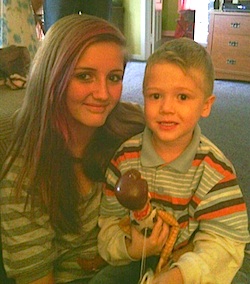 When you hear the word hero, I bet you think of a guy with a cape on in a comic book or on TV? I did until my little cousin Hawke was born on May 14th, 2008. Hawke and his twin brother Jaxon were first pronounced dead at birth. Doctors had to make many resuscitation attempts to revive both boys. Finally after twelve long minutes, Hawke took his first breath! Sadly Jaxon did not survive.
When you hear the word hero, I bet you think of a guy with a cape on in a comic book or on TV? I did until my little cousin Hawke was born on May 14th, 2008. Hawke and his twin brother Jaxon were first pronounced dead at birth. Doctors had to make many resuscitation attempts to revive both boys. Finally after twelve long minutes, Hawke took his first breath! Sadly Jaxon did not survive.
During the resuscitation attempts, a hemorrhage formed in Hawke’s brain causing Hydrocephalus. Hydrocephalus is a rare condition where there is an excessive amount of fluid that builds up in the brain. Doctors, then figured out they had needed to place a shunt in his head, to help drain the excess fluid that builds up in his brain. Unfortunately for Hawke, this would not be the only surgery he would have to have done. He has had a total of fourteen brain surgeries due to shunt failure.
Hawke has spent two of his four birthdays in the hospital, within these four years Hawke has had to go through a lot, not only all the surgeries on his head but he has had to get corrective eye surgery done twice. He also has to go to therapy for his motor skills. Hawke wears braces on his legs and has to use a special walker to help him get around.
Amazingly enough, I have to say that I have never seen such a courageous boy! He comes out of all the surgeries and everything else that he continuously has to go through and yet every time he has a smile on his face! I remember just recently I had to get my tonsils out and I was really scared, and all I could think about was how scared he must have been, I believe that just thinking of him helped me not to be so scared of the surgery.
When I look at my little cousin I see such a strong brave boy. Hawke is a very Kind, Sweet, Spectacular little boy! And he definitely puts up a good fight. Hawke may have some challenges but don’t let that fool you cause he is bound and determined to prove all the doctors wrong. He loves playing with his baby brother, Canyon, and his older sisters, Alani and Jacie. He has an amazing spirit and is simply an inspiration to all.
Hawke is definitely a miracle and a great blessing from God. I am very proud to be able to say that my cousin Hawke is MY personal Michigan Hero!!
PHF Hawaii In The News: Hydrocephalus Medical challenge builds hope, strength, support
January 30, 2013 by PHF
Filed under Uncategorized
Comments Off on PHF Hawaii In The News: Hydrocephalus Medical challenge builds hope, strength, support
![]() Last year, Shaurell Tremaine met a couple at Kapiolani Medical Center for Women and Children whose child was about to undergo surgery to have a shunt placed for hydrocephalus.
Last year, Shaurell Tremaine met a couple at Kapiolani Medical Center for Women and Children whose child was about to undergo surgery to have a shunt placed for hydrocephalus.
Tremaine’s son, Christian, now 14, had the same surgery not long after he was born. For Tremaine, the meeting with the couple last year was a chance to offer encouragement to those in a position she had experienced more than a decade earlier.
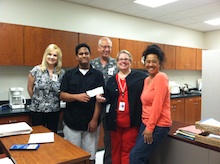 “It was just really overwhelming,” Tremaine said, recalling the early days of Christian’s diagnosis. The thought that got her through the surgery and the five months Christian spent at Kapiolani was to “do this one thing at a time.”
“It was just really overwhelming,” Tremaine said, recalling the early days of Christian’s diagnosis. The thought that got her through the surgery and the five months Christian spent at Kapiolani was to “do this one thing at a time.”
That’s a message she wants to share with other parents, especially those living on Hawaii Island. A resident of Waikoloa and employee at Waikoloa Elementary and Middle School, Tremaine knows of just two other children on the island who have been diagnosed with the condition. But with more than 1 million people across the country believed to have the condition, which occurs when the brain is unable to absorb cerebrospinal fluid, Tremaine said she believes more island residents could have the incurable, lifelong condition.
According to the Pediatric Hydrocephalus Foundation, as the cerebrospinal fluid accumulates, it widens brain spaces known as ventricles. That widening creates potentially harmful pressure on brain tissue, the foundation’s website, hydrocephaluskids.org, said. Hydrocephalus can be congenital, meaning an infant is born with it, or be the result of a traumatic brain injury.
Tremaine and her sister, Shaula Tualaulelei, want to be able to connect with other families here who deal with hydrocephalus, as well as continue to raise money for hydrocephalus research and awareness. Through the foundation, the family participated in a fundraiser last year that provided donations to Kapiolani, as well as $1,000 to Kona Community Hospital, for a neonatal resuscitation training program.
Christian was born at Kona Community Hospital in January 1999, via an emergency Cesarean section when Tremaine was about six months pregnant. He was rushed to Kapiolani, while Tremaine remained in Kona as she recovered from the surgery and a subsequent infection. About two weeks after he was born, doctors at Kapiolani called to tell her Christian had suffered from a brain bleed, something they described as similar to a stroke.
They wanted her permission to operate and place a shunt — a plastic tube placed in the brain or just outside the spinal cord — to drain the excess fluid to his abdomen, where it would be absorbed. She said yes, and headed to Oahu the next day.
“We didn’t know what to expect,” Tualaulelei said.
Christian, who weighed only 2 pounds, 12 ounces at birth, remained small for years, Tremaine said. When he was 2, he looked like he was maybe half that old. She needed to learn how to care for an infant with special needs and doctors warned her he might also have cerebral palsy. A state early childhood development therapist made home visits, working on his fine and gross motor skills.
Tremaine took him to the beach, where he gained strength enough to surprise his doctors.
“He started walking, talking,” Tremaine said, adding Christian met the milestones, even if they were delayed.
The first two years of his life, he was medevaced to Oahu “a lot of times,” but in the years since, until last year, he remained fairly healthy. Last February, Tremaine noticed her son seemed not to feel well, although he claimed he was fine.
They went to North Hawaii Community Hospital, where doctors discovered four tears in his shunt tubing, probably the result of years of use. They went to Oahu to visit the sole neurosurgeon in the state and Christian underwent surgery. A week later, recovering at home, he began vomiting. Tremaine took his temperature and discovered he had a 103 degree fever. They headed back to North Hawaii Community Hospital, where he was medevaced again. This time, though, the neurosurgeon was out of the country.
Their only option, Tremaine said doctors told her, was to ask military officials if Tripler Medical Center would admit and treat him. The military hospital agreed to do so. By the time he reached Tripler, his fever was nearing 107 degrees. Several surgeries — including one to install an external shunt to hold him over until his neurosurgeon returned — and several months later, Tremaine was finally able to return to the Big Island.
Through it all, it was her son’s positive outlook that helped Tremaine hold herself together.
“It was hard,” Tremaine said. “He’s strong. I was about to lose it. I was about to cry. He’d look at me and say, ‘Mom, I’ve been through so much. What’s one more?’ He’s always smiling.”
Christian, a quiet young man, said the situation — the shunts, the surgeries, the reminders to be careful and avoid full-contact sports — is just his normal life. His school principal, Kris Cosa-Correira, described him as a great kid.
“He’s awesome,” she said. “He hated staying home. He’s very well liked, very popular. He doesn’t have an enemy in the world.”
Last year’s extended hospital stay, during which Tualaulelei cared for Tremaine’s 15-year-old daughter, prompted Tualaulelei to learn more about hydrocephalus. She found the Pediatric Hydrocephalus Foundation, contacted the organization and got support from them.
“You really need to hear those encouraging words,” Tualaulelei said. “That’s what the foundation brings, support.”
The foundation’s ultimate goal is to raise money for hydrocephalus research, in hopes of finding a cure.
Foundation officials, noting a limited presence in Hawaii, named Tualaulelei one of two state directors. Already, her involvement has helped her meet other people on Hawaii Island dealing with a hydrocephalus diagnosis in their family.
“We knew we had to reach out,” Tualaulelei said. “This allows other families to know, here’s a network of families.”
For more information about the foundation, contact Tualaulelei at shaula@hydrocephaluskids.org.
Ind. woman educates others about hydrocephalus
January 27, 2013 by PHF
Filed under Uncategorized
Comments Off on Ind. woman educates others about hydrocephalus
 BLOOMINGTON, Ind. (AP) — When 25-year-old Megan Elmore was 20 weeks pregnant with her second child, she underwent a routine ultrasound in the office of her Bloomington obstetrician/gynecologist.
BLOOMINGTON, Ind. (AP) — When 25-year-old Megan Elmore was 20 weeks pregnant with her second child, she underwent a routine ultrasound in the office of her Bloomington obstetrician/gynecologist.
“Her head measurement was way off,” said Elmore, a single mother from Gosport whose firstborn is a healthy 2-year-old son. “I was very concerned.”
Further testing at two Indianapolis hospitals revealed that her baby, Aila, had hydrocephalus — an incurable condition that causes excessive fluid to collect in the brain, abnormally enlarging the head and placing potentially fatal pressure on brain tissues. The disorder affects about 1 in every 500 births.
When Aila was born four months ago, her head circumference was 46 centimeters, about 11 centimeters larger than normal for a full-term newborn. At the Riley Hospital for Children at IU Health, doctors placed a shunt into her skull just above her temple to drain fluid from her brain into a tube that empties into her abdomen.
But the shunt does not drain all the excess fluid because Aila is missing most of her cerebral cortex, a sheet of neural tissue in the brain that plays a key role in memory, attention, perceptual awareness, thought, language and consciousness.
“If they drained all the fluid, her brain would collapse and she would probably die,” Elmore told The Herald-Times (http://bit.ly/XQB5wv ). “So the shunt is used to keep her fluid level stable and prevent the pressure on her brain from becoming dangerous. She will need the shunt for the rest of her life.”
Elmore said it’s too early to know the long-term effects of Aila’s condition, which can cause such things as learning disabilities, memory problems, motor skill disabilities, seizures and hearing or vision problems.
“The doctors can’t say whether she will be able to walk or talk,” she said. “But so far, she is eating and breathing on her own. My hope is that she will be able to have a life as full and productive as humanly possible.”
During her pregnancy with Aila and after her daughter’s birth, Elmore received a wealth of support from not only from her mother and other family members, but also from the Pediatric Hydrocephalus Foundation, a nonprofit organization with 30 state chapters that funds research and provides support to families, friends and children affected by the disorder.
“The foundation helped me know what questions to ask the doctors,” Elmore said. “There are times when I got overwhelmed, and the people at the foundation calmed me down and explained things to me or told me where I could find the information I wanted.”
So when Elmore learned the director of the Pediatric Hydrocephalus Foundation’s Indiana chapter had stepped down, she volunteered to fill the position.
“I didn’t want any family to face hydrocephalus alone,” said Elmore, who answers to a board of directors. “I wanted to make sure the state chapter would be there so they could get the same kind of help and support that I received.”
Since assuming the directorship in November, Elmore has placed educational pamphlets about hydrocephalus in pediatricians’ offices, made efforts to form family support groups, and put information about the state organization on Facebook.
“I also hope to have two local fundraisers within the next year that will include all the kids and their families,” she said.
Elmore was recently delighted to learn that the national Pediatric Hydrocephalus Foundation has selected Aila and a young boy to be the 2013 faces of the organization. The two infants, along with their stories, will be printed in pamphlets that will be mailed to U.S. congressional representatives and used in other educational outreach efforts.
“The foundation is hoping their story will inspire families to realize that just because your child has hydrocephalus, it doesn’t mean your child’s life is over,” she said.
The Pediatric Hydrocephalus Foundation raises awareness about the disorder and raises money for research on treatment options and, hopefully, a cure. The foundation also advocates on behalf of members by asking state and federal legislators to push for more research and support in the fight against hydrocephalus.
Since 2010, the foundation has awarded $125,000 in grants and donations to hospitals, neuroscience institutes and medical research centers for research and education.
 Read more at: https://html.com/attributes/img-width/>
Read more at: https://html.com/attributes/img-width/>









